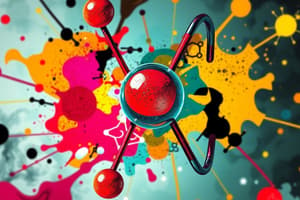Podcast
Questions and Answers
Which particles make up an atom?
Which particles make up an atom?
- Protons and neutrons
- Protons, neutrons, and electrons (correct)
- Electrons and neutrons
- Protons and electrons
What distinguishes one chemical element from another?
What distinguishes one chemical element from another?
- The number of protons (correct)
- The number of electrons and protons
- The number of electrons
- The number of neutrons
Which element has an atom with 29 protons?
Which element has an atom with 29 protons?
- Sodium
- Copper (correct)
- Carbon
- Oxygen
What defines the isotope of an element?
What defines the isotope of an element?
Why can't atoms be seen with conventional microscopes?
Why can't atoms be seen with conventional microscopes?
Study Notes
Structure of an Atom
- An atom consists of a nucleus containing protons and neutrons, surrounded by a cloud of electrons.
- Electrons are bound to the nucleus through electromagnetic forces.
Basic Characteristics
- Atoms are the fundamental particles of chemical elements.
- Elements are defined by the number of protons in their atoms; for instance:
- 11 protons = sodium
- 29 protons = copper
- The number of neutrons in an atom differentiates isotopes of the same element.
Size of Atoms
- Atoms measure approximately 100 picometers in diameter.
- A human hair is about a million carbon atoms wide, illustrating atomic scale.
- Atoms fall below the shortest wavelength of visible light, making them invisible to conventional microscopy.
Physical Behavior and Mass
- Classical physics cannot predict atomic behavior accurately due to quantum effects.
- Over 99.94% of an atom's mass is concentrated in the nucleus.
- Protons carry a positive charge; electrons possess a negative charge, while neutrons are neutral.
Studying That Suits You
Use AI to generate personalized quizzes and flashcards to suit your learning preferences.
Description
Test your knowledge of atoms and chemical elements with this quiz! Learn about the structure of an atom and how elements are distinguished by the number of protons. Can you identify different elements based on their proton count? Find out now!




